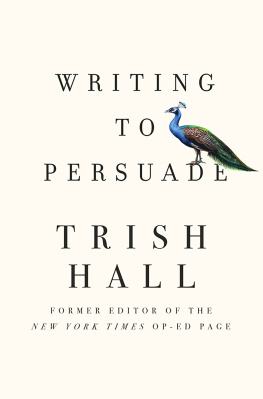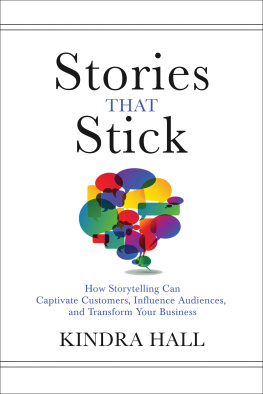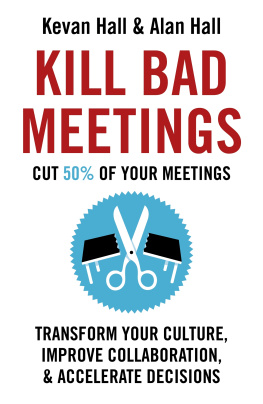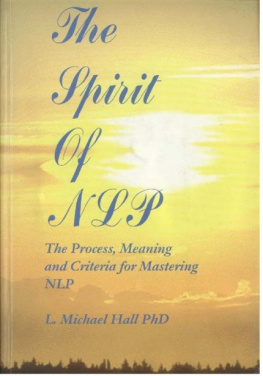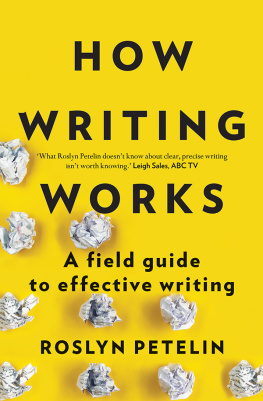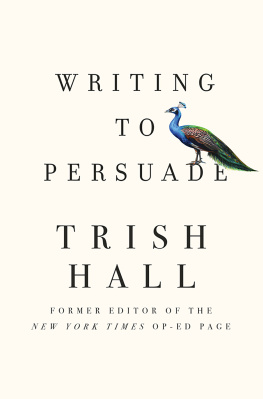Contents
Guide

Writing to Persuade

How to Bring People Over to Your Side
TRISH HALL

Copyright 2019 by Trish Hall
All rights reserved
First Edition
For information about permission to reproduce selections from this book, write to Permissions, Liveright Publishing Corporation, a division of W. W. Norton & Company, Inc.,
500 Fifth Avenue, New York, NY 10110
For information about special discounts for bulk purchases, please contact
W. W. Norton Special Sales at specialsales@wwnorton.com or 800-233-4830
Book design by Ellen Cipriano
Production manager: Anna Oler
ISBN 978-1-63149-305-8
ISBN 978-1-63149-306-5 (ebk.)
Library of Congress Cataloging-in-Publication Data is available
Liveright Publishing Corporation, 500 Fifth Avenue, New York, N.Y. 10110
www.wwnorton.com
W. W. Norton & Company Ltd., 15 Carlisle Street, London W1D 3BS
To my teachers
CONTENTS
For almost five years, as the person in charge of Op-Ed for The New York Times , I was immersed in argument, in passion, in ideas. I oversaw a dozen editors who read submissions from both the august and the unknown, all eager to be heard. Two assistants, looking for gems, pored over the hundreds of unsolicited manuscripts that arrived each week. I too read many pieces, a number so high that I never counted it. There was no time.
I was grateful for that perch, for the chance to know writers and editors who amazed me with their knowledge and creative minds. But I was also surprised by the flood of terrible writing from the famous and successful. Manicured products of Ivy League schools offered tangled sentences and mundane musings. People whose novel ideas deserved a hearing could not escape their jargon long enough to reach an audience.
At first this sea of opinionfrom people eager, desperate even, to get their point across, to enter the flow of argumentwas foreign to me. I had always been a journalist with no case to make, no argument to win. Whether I was reporting or writing or editing, and over the years I did all three, I was happy to absorb the thoughts and feelings of others. I had no interest in presenting my own point of view. I often thought I had no point of view, because early on I recognized a disconcerting tendency to be a chameleon, to use whatever was convenient from my past to make a connection with my subject.
Was I trying to bond with a working-class mother from the South? Then I would talk about growing up in rural Pennsylvania and how my stepfather had a dog kennel, and wasnt it funny how the dogs would bark every day at five, as if they were announcing cocktail hour? Was I interviewing a professor at Harvard? I would mention that my father had gotten his masters degree at Harvard, ten years before he moved to Los Angeles. I could be rural, urbanwhatever suited my purposes.
I hadnt arrived in Op-Ed with an academic bent or experience on a journal of opinion and argument, as some others had. Opinion was a new world to me, and a frightening one at first. Over time I realized how lucky I was. The job gave me a chance to listen to Americas feelings and thoughts, and do my best to help people reach an audience. If an idea spoke to me, whether from the right or the left, or even from no political persuasion, I was sure it would speak to others.
In Writing to Persuade , I hope to pass on to you what I have learned about writing and editing. I want to help you get your point across in a persuasive way , whether you are crafting an op-ed, a paper for a professor in college, an email seeking a job, or even a note to your husband. Although the book is mostly about writing, I occasionally wander into some of the psychology underlying these approaches. Knowing about human behavior is also useful when communicating face to face.
So, you might ask, are there rules for argument, for persuasion, for convincing people that they should listen to you? Yes, there are. Although its challenging to change minds, there are fundamentals of persuasion, techniques for bringing people over to your side not only in written arguments, but in life. Like so many rules, they arent easy to follow. And like all rules, they can be successfully broken. You could violate all of these concepts and still persuade someone to see your point of view. But be assured that using these methods, which require artistry, technique, and an understanding of human psychology, will increase your odds of success.
Here then are fifteen principles that Ive come to rely on over my career.
Fifteen Principles of Persuasive Writing
Listen to people. The importance of thinking about your audience might be the most salient point I can make. Despite our culture of selfies, persuasion is not about you; its about them. Whether you are engaging in a one-on-one conversation or attempting to convince the readers of a publication with millions of subscribers that they should listen to you, the first and most crucial step is to listen to them. You need to know who they are and how they feel.
We believe what we believe. Understand that we all cling to our opinions, for all kinds of good reasons. If you tell people something negative about their favorite candidate, they might become even more supportive of that candidate. Theyve already invested in that opinion, and its not easy to get them to back away. These people arent stupid. Youre like that, tooyou just dont know it. Is there a point where its just not worth trying to reach those who dont agree with you? Of course. Sometimes you cant change people, and you have to accept that.
Respect your audience. Learn to be empathetic. Try to understand what it feels like to be them, to live their life. Thats not easy, but it is essential.
Dont get into fights. Mostly, arguing doesnt work. People become defensive or they just tune out. The only people who might respond positively to battering and bullying are the much maligned workers in customer service who have no choice but to accept aggression. Dont say things like Youre wrong, or Im right and you know it.
Play on feelings. Feelings are crucial, much more important than facts. As Richard Friedman, a psychiatrist and professor in New York, puts it, You have to use facts almost medically; you need to understand the mental and emotional state of your target audience to determine the right dose. We all respond to information that is emotionally engaging.
Understand moral values. Our moral values shape our interpretation of the world. You can get attention for your point of view only if you approach audiences with their values in mind, not yours.
Emphasize your similarities. People are more likely to agree with people who are similar to them. Likeable people are better than unpleasant people at persuading others to do what they want them to do. Be positive; be personable. Admit when youre wrong. Ive always found an apology or an admission of error, deftly applied, to be potent.
What do you know? Write about what you know, in an area where your expertise is uncontested. If youre a computer technician, write about hardware or software. If your father is dying, and youre outraged by how the medical system deals with end-of-life treatment, write about that. There will always be something that you know or feel, and thats what you should focus on.

